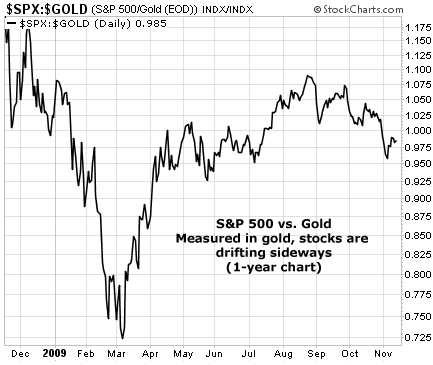| Home | About Us | Resources | Archive | Free Reports | Market Window |
|
Steve's note: Today's essay is adapted from a recent Dan Ferris piece published in the S&A Digest, a daily supplement to our publisher's premium subscription products. If you're not reading the Digest, you're missing out on one of the best daily publications you'll find anywhere in the world. Read on for some terrific insight from Dan Ferris on one of the most hated companies in the world... Why You Should Cheer the Most Hated Company in AmericaBy
Saturday, November 14, 2009
One of my favorite stocks in the world – Extreme Value recommendation Wal-Mart (WMT) – reported earnings this week.
Unlike most of the earnings reports you hear in the retail world, this one was genuinely good. Wal-Mart's net earnings rose 3.2%. The company says it expects sales for the current quarter – including the holiday season – to be flat or down 1%. CEO Mike Duke reported Wal-Mart is gaining market share "all over the world" as the economic crisis makes it harder to make ends meet... and a better idea to shop at Wal-Mart. Wal-Mart is firing on all cylinders these days, and not only because it's the best place to get low prices on everything from groceries to guns to gold jewelry. Wal-Mart is also serving those with little or no access to banking. This is classic Wal-Mart. Wal-Mart has always been good at serving customers other retailers shun (notably rural communities). Back in 2007, the banking establishment prevailed in pressuring the government to block Wal-Mart from starting its own bank. So Wal-Mart decided to build its financial services in other ways. One of its most popular financial products is prepaid debit cards. Considering the enormous overdraft fees charged by banks, paying $2 a pop for a prepaid card is a bargain. Wal-Mart cut the fee from $3 to $2 back in February, a perfect moment when the country's banks were wallowing in the disgrace of bailouts and scandals. As of last February, Wal-Mart had sold more than 2 million prepaid cards, accounting for more than $2 billion worth of transactions. Wal-Mart also offers money-transfer, check-cashing, and bill-payment services at more than 3,500 U.S. stores. In a few more years, Wal-Mart will be right in the big banks' faces, doing what they've been trying to do (or at least talked about doing) for years – serving the unbanked and underbanked customer, a vast sea of individuals with too little money to participate in the traditional banking system. The big banks have failed miserably only because they can't figure out how to collect enormous fees from a customer who has little money. Banks only want customers they can keep captive with checking accounts, credit cards, and other products that allow them to charge you fees you don't even know you're paying. How have the big banks responded to the poor economy? They've raised interest rates and fees on credit cards. I canceled a Chase business card, which I've paid faithfully, because the bank raised my interest rate to 29%. If they're charging me 29%, what are they doing with the customers who don't pay on time? 129%?! Wal-Mart isn't like that. As Lloyd Constantine, a class-action lawyer who represented Wal-Mart in its case against Visa and MasterCard, put it: "Wal-Mart's instincts are just the opposite [of the banks'] – lower prices, lower excess, streamline, simplify." Constantine told American Banker, "That approach to banking is absolutely necessary and desired in the United States, and the fact that they were blocked from doing that is an absolute tragedy." Lloyd said if Wal-Mart had been granted a bank charter in 2007, it "would have served the American public well." So especially these days, whom is the low-income, underbanked customer going to trust? A bailed out "too big to fail" bank or Wal-Mart, the company that offers customers the lowest-cost option for groceries and other basic items? I vote for Wal-Mart and against the government and its banker pals. I said it three years ago when I wrote The War Against Poor People, my initial Wal-Mart recommendation. And I'll say it again today: Wal-Mart is a revolution. It was a discount-store revolution. It's a jewelry-store revolution. It became a grocery-store revolution. Now, it's a financial-services revolution, at possibly the most perfect moment in history for such a revolution to happen. It is a perfect irony the government and the banks refused to grant Wal-Mart a banking charter back in 2007. Now, both the government and the banks are more and more discredited every day, and Wal-Mart continues helping everyone save money. No organization is perfect... and Wal-Mart still has its critics. But compared to the liars and thieves that staff the highest levels of our banking system and the government, it's obvious Wal-Mart is one of the best friends the average American could possibly ask for. Good investing, Dan Ferris Editor's note: Dan Ferris is the editor of Extreme Value, an investment advisory focused on the safest, highest returning stocks in the world. Dan recently discovered an incredible anomaly in the stock market: A small precious-metals company that not only offers more than 1,000% profit potential – but huge safety as well. To learn how Dan discovered this idea, click here.
Further Reading:
The War Against Poor People Market NotesHOW THE RICH SEE THE RALLY
|
In The Daily Crux
Recent Articles
|


